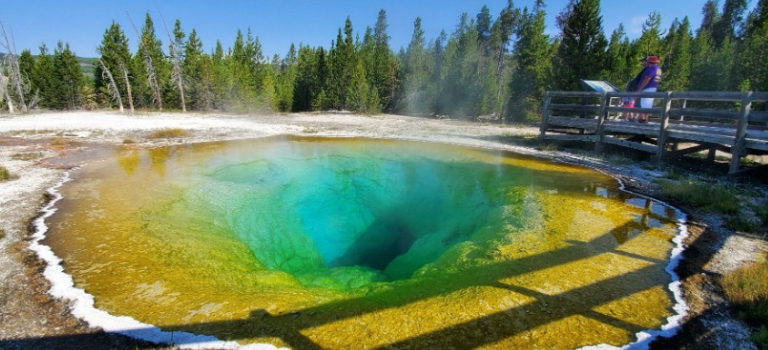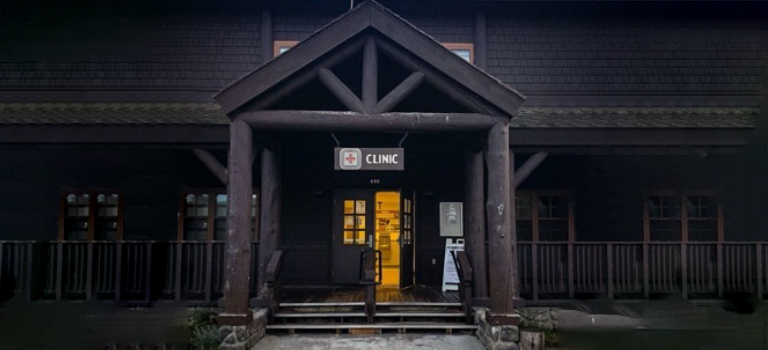Yale PA Online Students Spend Clinical Rotations in Yellowstone National Park
In the Yale School of Medicine Physician Assistant Online (PA Online) Program, 20% of the clinical rotations, comprising 12 weeks, are reserved for electives, providing students a chance to explore specialized areas of clinical practice, like cardiology or neurosurgery.
Two Yale PA Online students—Luke Counterman ‘21 and Jeena Kinney ‘21—spent a portion of their clinical experience in Yellowstone National Park, a demanding and remote clinical environment, where they were able to develop critical skills in austere medicine.

Morning Glory Pool, Yellowstone National Park
Exploring an interest in emergency medicine
Counterman and Kinney each developed a passion for emergency medicine through previous jobs—Counterman was an EMT, Kinney a firefighter. When they met in the Yale PA Online Program, recognizing their shared interest, they founded Yale PA Online’s Wilderness Medical Society, a Student Interest Group that helps students learn more about wilderness medicine, build relationships with like-minded peers, and explore opportunities for career growth.
The students were drawn to the Yale PA Online Program in part because they thought there would be more flexibility in where they could perform clinical rotations. “In many traditional campus programs, they discourage you from suggesting locations for clinical rotations,” says Counterman. “I knew I wanted more hands-on experience in emergency medicine.” With help from Yale PA Online faculty member Mary Showstark, MPAS, PA-C, Counterman and Kinney were able to secure a clinical rotation in emergency medicine at Yellowstone National Park, a competitive program with only six PA spots open to applicants from a significant number of programs around the country.
Developing specialized skills in a hands-on environment
Yellowstone National Park is one of the nation’s most popular tourist destinations, but it is also one of the most dangerous. There are 54 fatalities in the park every year. That is a small percentage of the four million annual visitors, but Yellowstone’s hot springs, wildlife, and terrain still pose potential hazards to visitors.
The real danger, however, is the size of the park and the limited access to medical services. When an accident happens, receiving swift, full-service medical attention is often an implausibility. In nearly all Yellowstone emergencies, first responders must do a lot with very little. This is austere medicine, and it is exactly why Counterman and Kinney signed up.
“I always knew I wanted to set up a role for myself in wilderness medicine,” shares Counterman. “You can only learn so much about this area of medicine without experiencing it yourself.”
“A lot of wilderness medicine is understanding what it’s like to live and exist in those environments,” says Kinney. “There’s limited cell service, and the nearest town is sometimes over an hour away.”
During the rotation, Kinney treated a patient who sustained a life-threatening right leg laceration after a bike accident.

Old Faithful Medical Clinic, Yellowstone National Park
“The call came in over the radio, and the supervising PA said that one of the assistants could handle the stitches,” recounts Kinney. When the EMTs arrived with the stretcher, it was clear that a few stitches would not be enough. The patient had severed his femoral artery and a helicopter was needed to airlift the patient to a nearby hospital.
Unfortunately, poor weather conditions made it impossible for a helicopter to land for at least 45 minutes. While they waited, Kinney and the rest of the team kept the patient alive with limited resources.
Ultimately, the patient made it to the hospital and fully recovered. Counterman even took his stitches out a couple weeks later.
In an urban setting, when a patient needs emergency medical attention, you can call a surgeon. “If we had been at a hospital in Denver, the team would have rolled the patient directly into the operating room. Out here, you can’t do that,” explains Kinney. “Sometimes a weak radio signal to the park’s clinic is the only communication you have. These are situations that you can’t prepare for without living through them yourself and this rotation is a prime example of the PA Online Program’s ability to reach these environments.”
Citation for this content: Yale School of Medicine Physician Assistant Online Program

